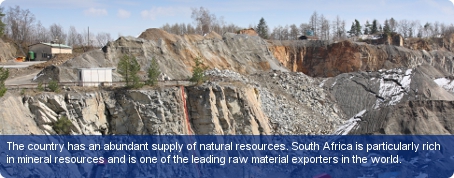Find a business in South Africa

South Africa has seen steady growth over the last 20 years, led by the manufacturing, tourism and financial services sectors. The country has emerged as an upper-middle-income emerging market with an abundant supply of natural resources. It has a GNI per capita of US$7,610 (2012) and has seen GDP growth of 2.2% per annum in 2008-12. South Africa has the some of the world’s largest reserves of gold, manganese, platinum, chromium, andalusite, vanadium and alumina-silcates, and mining and minerals processing generates more than half of export revenue (2010).
Besides minerals and mining South Africa has well-developed financial, legal, communications, energy and transport sectors. The Johannesburg Stock Exchange ranks among the ten largest in the world and the country has a modern infrastructure supporting the efficient distribution of goods and services to major urban centres throughout Sub-Saharan Africa.
The manufacturing sector is integral to South Africa’s growth, contributing 18% of the country’s GDP (2007), with the whole industry sector accounting for 31% of GDP in 2010. The automotive industry has traditionally been the largest sub-sector and many multinational companies use the country to source components and assemble automobiles. Other major manufacturing and industry sub-sectors in South Africa include the fashion industry (textile, clothing and footwear), agricultural processing, chemicals, metals, and ICT and electronics.
South Africa’s capital, Johannesburg, is often referred to as the City of Gold because for years the city’s prolific gold mines made South Africa the largest producer of gold in the world. In recent years, however, China has moved into the top position. Gold has become less prevalent in South Africa’s economy because of continued diversification into other sectors. However, 80% of the world’s platinum is still supplied by South Africa, and it is the fourth largest producer of diamonds.
Estimates have put South Africa’s oil and gas resources at 15 million barrels of proven oil reserves (January 2011) and 27.16 million cubic metres of proven natural gas reserves (January 2006).
The economy of South Africa has grown steadily since the end of apartheid in 1990 and elections in 1994. South African economic policy is fiscally conservative but pragmatic, focusing on targeting inflation and liberalising trade as means to increase job growth and household income. The government introduced a comprehensive Black Empowerment Policy in order to reduce the historical inequality which has existed between racial groups.
Despite this growth, the economy has failed to reduce the country’s high unemployment rate. Poverty, HIV/AIDS, illegal immigration and crime remain the major problems facing the country.
The advanced infrastructure mechanisms that South Africa has allows for efficient freight forwarding and shipping of goods by land, air and sea. Over 90% of South Africa’s trade volume is transported by sea, translating to 80% in value terms. This makes the country strategically reliant on the maritime transport industry. Its transport system is well established, with just under a quarter of roads being paved. The major cities have international airports, with domestic airports found in many of the smaller cities.
South Africa is ranked number one in the world for getting credit and tenth best for protecting investors, according to the World Bank’s ‘Doing Business 2012’ study. In the overall ease of doing business category, it is placed 35th between Israel and Qatar. These rankings measure the conduciveness of a regulatory regime in starting and operating a business.
The literacy rate among people aged 15-24 is 98.9% (2012), while for adults it is 93.7% (2012). Although the country has 11 official languages, English is spoken and understood by most. South Africa’s labour force participation rate is 54.8% (2009).





